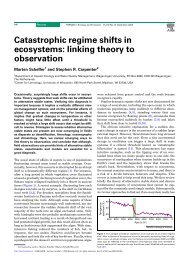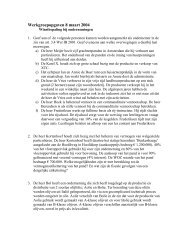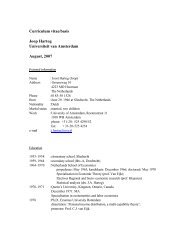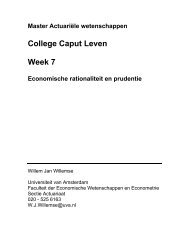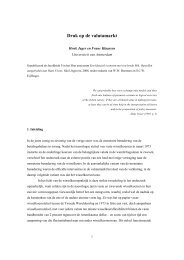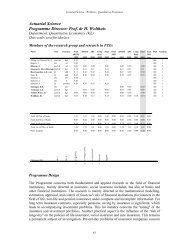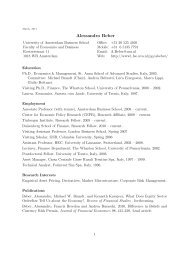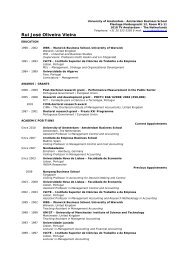A meta-analytically derived nomological network of procrastination
A meta-analytically derived nomological network of procrastination
A meta-analytically derived nomological network of procrastination
Create successful ePaper yourself
Turn your PDF publications into a flip-book with our unique Google optimized e-Paper software.
1410 W. van Eerde / Personality and Individual Differences 35 (2003) 1401–1418<br />
with the fact that they procrastinated, they may not give full attention to the task, possibly<br />
affecting performance negatively. As not everyone is equally affected emotionally by <strong>procrastination</strong><br />
(cf. Milgram & Naaman, 1996), those who are not affected should not be performing<br />
worse.<br />
One <strong>of</strong> the limitations is that the performance measures were necessarily restricted to student<br />
performance. In other contexts, the results may be different. This calls for research on a wider<br />
range <strong>of</strong> behaviours. The influence <strong>of</strong> <strong>procrastination</strong> on some everyday behaviours have been<br />
studied, such as returning surveys (Ferrari, 1992), or cashing in gift certificates (Ferrari, 1993).<br />
But there are no studies that related <strong>procrastination</strong> to work performance.<br />
Another limitation may be the scales used in some <strong>of</strong> the research that may have confounded<br />
<strong>procrastination</strong> with the feelings about <strong>procrastination</strong>, such as the Procrastination Assessment<br />
Scale for Students (Solomon & Rothblum, 1984) in particular (cf. Milgram & Naaman, 1996), so<br />
that the correlations <strong>of</strong> <strong>procrastination</strong> with affect may be somewhat inflated (see van Eerde, in<br />
press).<br />
The nonexperimental designs do not allow a conclusion as to whether <strong>procrastination</strong> is preceded<br />
or followed by, confounded with, or spuriously correlated with, a certain variable. A more<br />
general limitation involves the use <strong>of</strong> self-reports. If one admits to doing these so-called irrational<br />
things, perhaps admitting to <strong>procrastination</strong> is more likely. In most <strong>of</strong> the studies included,<br />
common method bias may have caused the correlations to be inflated. These limitations may have<br />
been reflected in the effect sizes between <strong>procrastination</strong> and neuroticism, trait anxiety, and state<br />
anxiety, which are highly similar in magnitude.<br />
The research in this review has been conducted from a dispositional point <strong>of</strong> view, and the<br />
interaction with situational or other important variables could not be assessed. It is unclear to<br />
what extent the effect sizes may generalize to tasks other than studying and to other populations<br />
than students. As stated before in the model, the psychologically relevant dimensions <strong>of</strong> situations<br />
that trigger <strong>procrastination</strong> should be studied. Some authors addressed this issue by<br />
exploring the dimensions relevant to task perception, in particular task aversiveness (e.g. Blunt &<br />
Pychyl, 2000;Lay, 1992;Milgram, Marchevsky, & Sadeh, 1995), but these studies are the exception<br />
rather than the rule, and there are not enough to combine <strong>meta</strong>-<strong>analytically</strong>.<br />
Overall, the correlations give a dysfunctional view on <strong>procrastination</strong>, but given the limitations<br />
<strong>of</strong> previous studies, can anything be concluded from this <strong>meta</strong>-analysis on how <strong>procrastination</strong><br />
affects performance? The high negative correlation between <strong>procrastination</strong> and conscientiousness<br />
and self-efficacy may indicate that <strong>procrastination</strong> is a predictor <strong>of</strong> poor performance,<br />
because conscientiousness (Barrick & Mount, 1991) has been demonstrated to be a predictor <strong>of</strong><br />
performance at work, and self-efficacy has been shown to be positively related to performance<br />
(Stajkovic & Luthans, 1998). However, the relation may also be in the opposite direction: poor<br />
performance may lead to anxiety, depression, lower self-efficacy and conscientiousness and a<br />
higher degree <strong>of</strong> <strong>procrastination</strong> to escape from the negative consequences. Also, ability can be<br />
expected to moderate the relation: <strong>procrastination</strong> may have a different effect on performance for<br />
individuals with high ability on the specific task than for individuals with low ability. Additionally,<br />
the same type <strong>of</strong> moderators may apply to conscientiousness and <strong>procrastination</strong>, that is, the<br />
extent to which a job requires accuracy and punctuality. For example, in pr<strong>of</strong>essions such as<br />
accountancy, missing deadlines may have important financial consequences, whereas it may be<br />
less relevant in creative pr<strong>of</strong>essions, where a good solution may be more important than getting it




